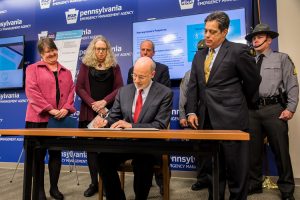Pennsylvania’s opioid crisis disaster declaration received a 90-day extension, Gov. Tom Wolf announced Wednesday.
The current disaster declaration was signed in January and was set to expire on April 10. The renewal continues a number of initiatives that began since the initial signing of the disaster declaration.
Pennsylvania ranked fourth in the country for opioid deaths last year.
“We have made real progress during the disaster declaration to stem the tide of this epidemic and provide better resources and coordination for those on the front lines,” Wolf said. “But it is critical that we keep building on our efforts at prevention, rescue, and treatment. I am extending the disaster declaration for another 90 days to ensure that my administration and local partners can continue to use every tool available to them to help people and communities in need.”
One of several initiatives introduced since the start of the disaster declaration has been issuing a naloxone leave-behind standing order. Medics in Bucks County, Fayette County, and Pittsburgh are already leaving an extra dose of the overdose reversal medication behind at home where they respond.
Another key initiative Wolf, a Democrat, touted Wednesday was expanded access to the Prescription Drug Monitoring Program. The program has opened database access to local and state agencies. The database also includes information from other states.
Among other initiatives mentioned by the governor were waiving annual licensing requirements for high-performing drug and alcohol treatment facilities, waiving fees, and speeding up access to birth certificates, adding non-fatal overdoses and neonatal abstinence syndrome as reportable conditions, and creating the Opioid Data Dashboard to connect the public with resources locally. Wolf said that 80 people have so far taken advantages of expediting their birth certificates so they can enter treatment facilities.
State Senator Jay Costa joined Wolf to discuss Senate Bill 1001. The legislation would enable the Pennsylvania Secretary of Health to declare the opioid crisis a “public health emergency.” The designation does not currently exist and would create a more streamlined process for reacting to epidemics, Costa told reporters.
“We need more tools to beat back the addiction crisis sweeping Pennsylvania, and I’m hopeful that a public health emergency designation will help the administration cut red tape and find creative solutions,” Costa said.
Wolf said the fight against the opioid epidemic will continue to require an “all-hands-on-deck approach.”









